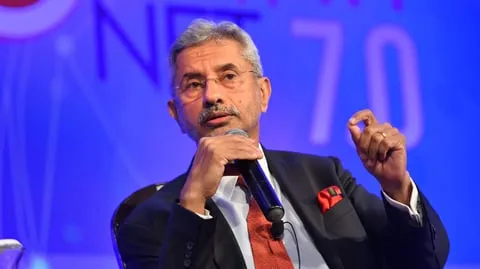In a significant move towards enhancing bilateral relations, Indian Foreign Minister S. Jaishankar’s recent visit to Kuwait has underscored the commitment of both nations to deepen their cooperation in various domains. This visit marks an important chapter in the growing partnership between India and Kuwait, reflecting a shared interest in fostering stronger ties and addressing mutual interests.
Table of Contents
Historical Context and Diplomatic Significance
India and Kuwait have a long history of diplomatic engagement, characterized by robust economic and cultural exchanges. Since establishing formal diplomatic relations in 1961, the relationship has evolved significantly, with both countries working closely in sectors such as trade, investment, and labor. Jaishankar’s visit, occurring in the context of this longstanding partnership, represents a strategic effort to reinforce and expand these connections.
Key Objectives of the Visit
Jaishankar’s trip to Kuwait was driven by several key objectives aimed at strengthening bilateral relations:
- Economic Cooperation: One of the primary goals of the visit was to enhance economic cooperation between India and Kuwait. Both countries have recognized the potential for increased trade and investment, particularly in sectors such as energy, infrastructure, and technology. Discussions during the visit focused on exploring new avenues for collaboration and identifying ways to address existing challenges.
- Energy Sector Collaboration: Kuwait, a major oil producer, and India, a significant consumer of energy, have a vested interest in deepening their cooperation in the energy sector. Jaishankar’s meetings with Kuwaiti leaders included discussions on ensuring stable and sustainable energy supplies. The aim was to establish a framework that would benefit both nations through strategic partnerships and long-term agreements.
- Labor and Employment: Another critical aspect of Jaishankar’s visit was addressing labor issues. India is a major source of skilled and semi-skilled labor for Kuwait, and discussions focused on improving the working conditions and rights of Indian workers in Kuwait. By addressing these concerns, both countries aim to enhance the well-being of workers while fostering a more productive and harmonious labor relationship.
- Cultural and Educational Exchanges: Beyond economic and labor-related discussions, Jaishankar’s visit also highlighted the importance of cultural and educational exchanges. Both nations share rich cultural traditions and educational interests, and there is a mutual desire to promote greater understanding and collaboration in these areas. Efforts to facilitate student exchanges, cultural programs, and academic partnerships were part of the broader agenda.
Diplomatic Engagements and Outcomes
During his visit, Jaishankar met with several high-ranking Kuwaiti officials, including the Prime Minister, Foreign Minister, and other key leaders. These meetings provided an opportunity for candid discussions on various issues, strengthening diplomatic ties and aligning strategic interests.
One of the notable outcomes of the visit was the signing of agreements aimed at bolstering economic and technological cooperation. These agreements are expected to pave the way for increased investments and joint ventures, contributing to the economic growth of both countries. Additionally, the discussions on energy cooperation resulted in a renewed commitment to ensuring reliable energy supplies and exploring new avenues for collaboration in the energy sector.
The visit also addressed the issue of labor rights, with both sides agreeing on measures to improve the conditions for Indian workers in Kuwait. This agreement reflects a shared commitment to ensuring fair treatment and enhancing the overall welfare of workers, which is crucial for maintaining a positive and productive relationship.
Broader Implications for Regional and Global Dynamics
Jaishankar’s visit to Kuwait is not only significant for bilateral relations but also has broader implications for regional and global dynamics. The strengthening of India-Kuwait ties can be seen as part of a larger strategy to enhance India’s presence in the Gulf region, which is crucial for economic and geopolitical reasons.
Kuwait, as a key player in the Gulf Cooperation Council (GCC), offers India an important gateway to deeper engagement with the GCC countries. By fostering stronger ties with Kuwait, India positions itself as a valuable partner in the region, contributing to regional stability and economic development.
Furthermore, the emphasis on energy cooperation aligns with global trends towards energy security and sustainability. As India continues to pursue its energy goals, collaboration with Kuwait on energy matters reflects a forward-looking approach to addressing the challenges and opportunities in the global energy landscape.
Conclusion
S. Jaishankar’s visit to Kuwait represents a significant step forward in the bilateral relationship between India and Kuwait. The discussions and agreements reached during this visit highlight the shared commitment of both nations to strengthen their partnership across various domains, including economic cooperation, energy, labor rights, and cultural exchanges.
As India and Kuwait continue to build on this foundation, the outcomes of Jaishankar’s visit are likely to pave the way for a more dynamic and mutually beneficial relationship. The strategic importance of this partnership extends beyond bilateral interests, contributing to regional stability and global energy security.
In essence, Jaishankar’s diplomatic mission to Kuwait is a testament to the growing and evolving nature of India-Kuwait relations. It underscores the potential for both nations to achieve greater heights through continued dialogue, collaboration, and shared vision.








